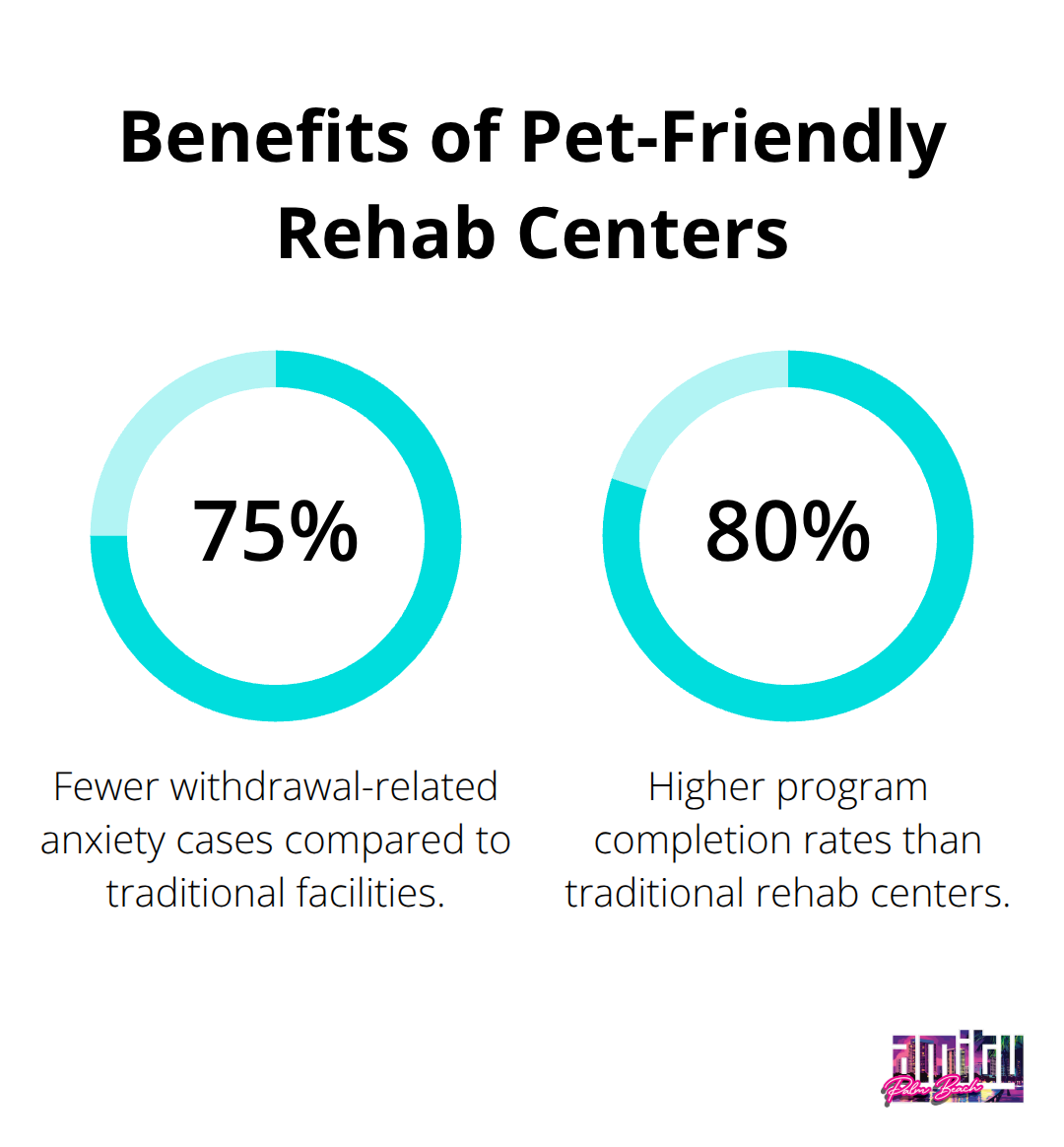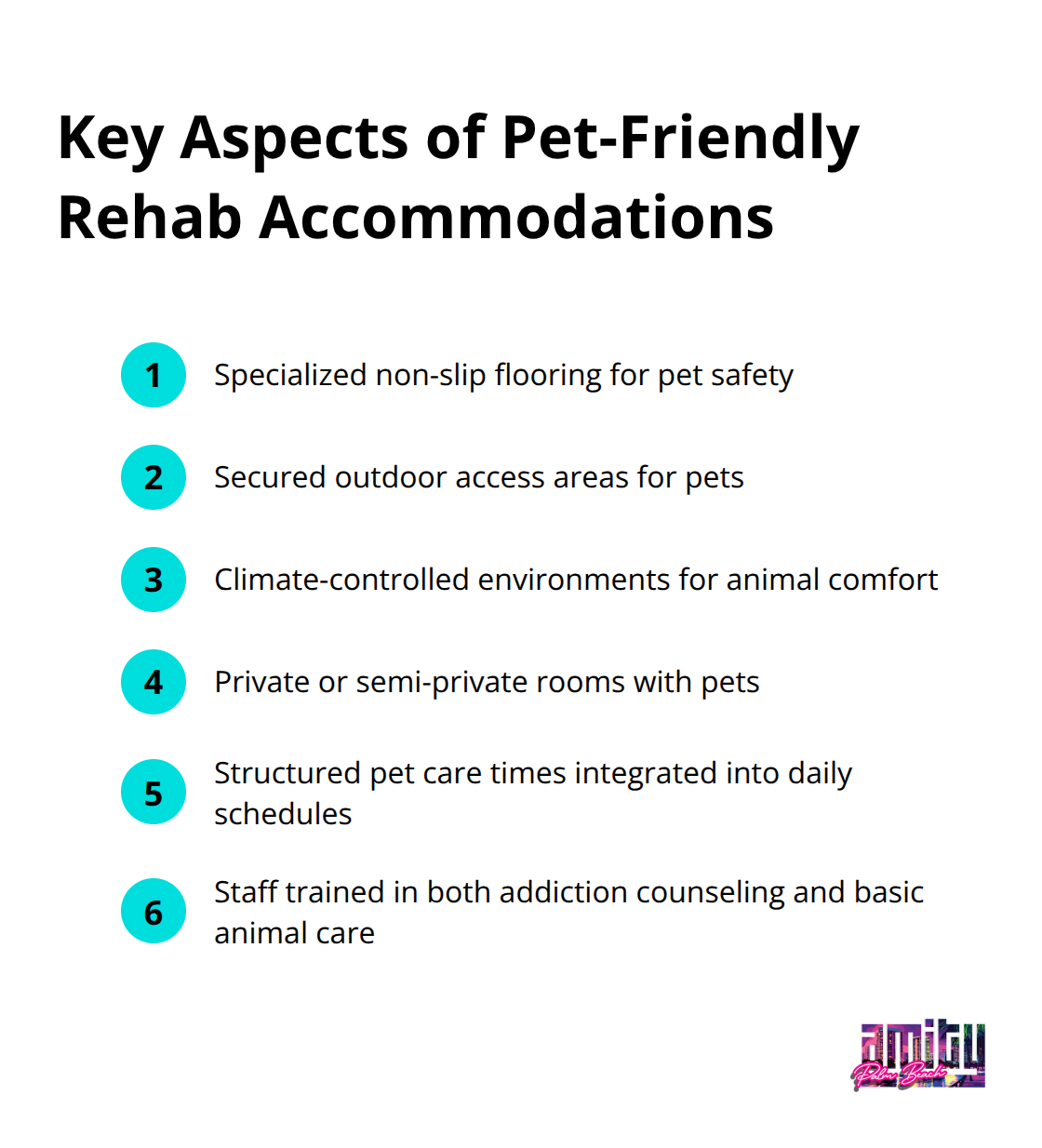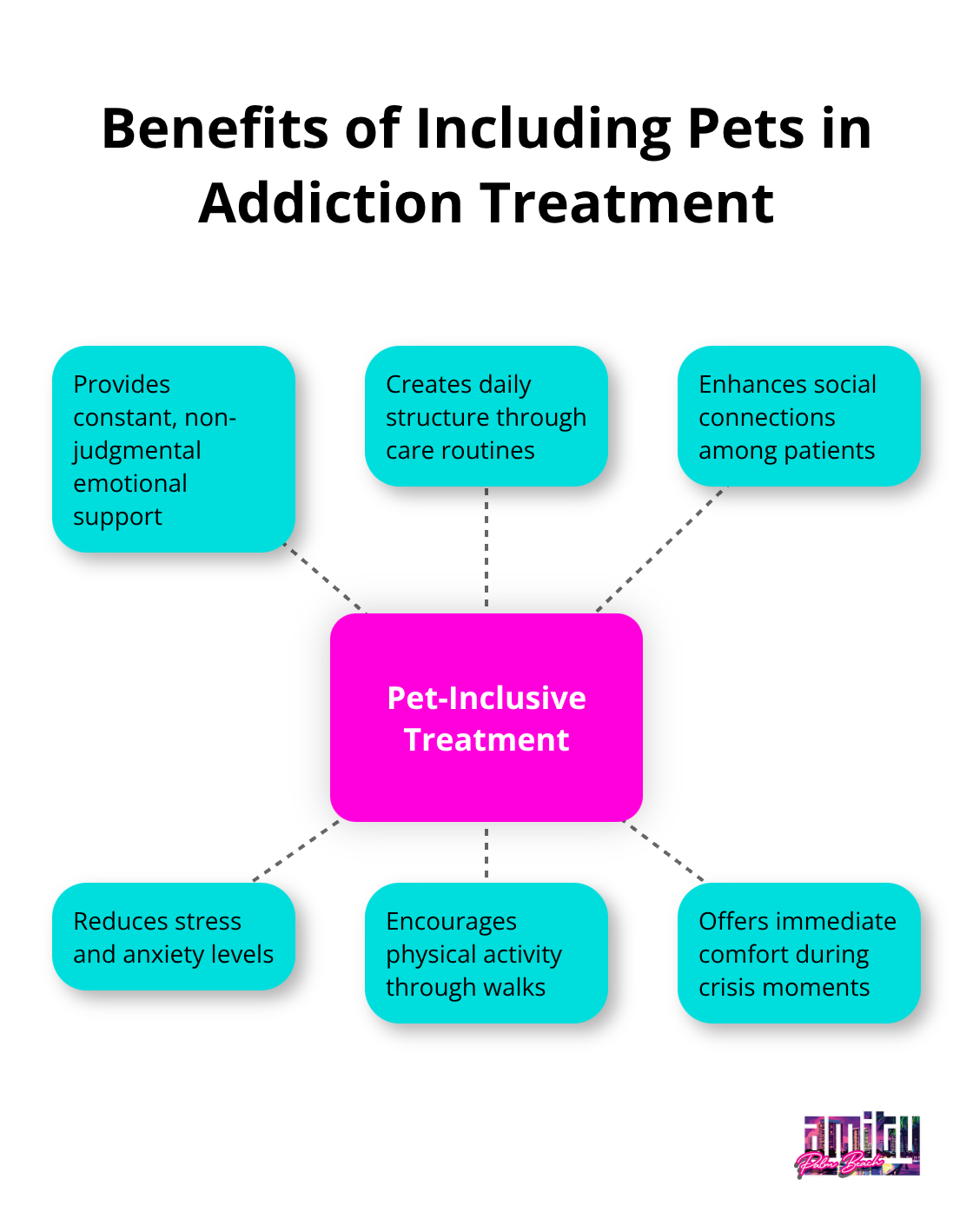Leaving your beloved pet behind during addiction treatment can add unnecessary stress to an already challenging journey. Many people don’t realize that pet-friendly rehab centers exist as a viable option.
We at Amity Palm Beach understand the powerful bond between pets and their owners. Your furry companion can actually become a valuable part of your recovery process.
What Pet-Friendly Rehab Centers Offer
Pet-friendly rehab centers provide comprehensive programs where your pet becomes an active part of your treatment plan. These facilities create structured environments that go far beyond simple pet accommodation. Recovery Centers of America has treated nearly 80,000 patients with this approach, establishing designated pet-friendly housing with specialized flooring and outdoor access areas.

Your daily schedule includes structured time for pet care activities like feeding and walking. Therapeutic sessions incorporate mindful walks and outdoor therapy with your companion. Research and systematic reviews robustly support the positive impacts of animal-assisted therapy on mental and physical health, especially in recovery, creating measurable improvements in emotional stability during recovery.
Program Requirements and Health Standards
Most facilities require current vaccinations and behavioral assessments before admission. Beach House Center for Recovery in Florida and Passages Malibu have established strict guidelines where aggressive animals cannot participate. Well-behaved pets receive on-site veterinary care or access through local partnerships for medical needs.
Your pet must demonstrate non-aggressive behavior and pass comprehensive health screenings. Programs integrate evidence-based therapies like Cognitive Behavioral Therapy and Dialectical Behavioral Therapy with animal-assisted activities. Studies show that rehab centers that allow pets report fewer withdrawal-related anxiety cases and higher program completion rates compared to traditional facilities.
Treatment Program Options
Residential programs offer the most comprehensive pet integration, where your animal lives with you throughout treatment. Intensive outpatient programs may allow pets during certain therapeutic activities but require external housing arrangements. Some facilities focus specifically on emotional support animals (prescribed by licensed mental health professionals), while others welcome any well-behaved pet.
Luxury treatment centers often provide premium amenities like on-site dog parks and specialized pet care staff. Over a dozen Recovery Centers of America locations across multiple states offer more accessible options for various income levels. These programs demonstrate how pet integration enhances the therapeutic environment and supports your emotional well-being throughout the recovery process.
How Pets Transform Your Recovery Experience
Pets create measurable therapeutic benefits that traditional treatment methods often struggle to replicate. The American Psychological Association found that interactions with animals decrease cortisol levels while they increase serotonin and dopamine production, which creates natural mood stabilization during the most vulnerable recovery phases. Your pet provides constant, non-judgmental companionship that combats the shame and isolation that typically derail treatment progress. Studies consistently show that patients with pet support complete their programs at significantly higher rates than those without animal companions.
Daily Structure Creates Recovery Foundations
Your pet demands consistent feeding, walking, and care schedules that naturally create the structured lifestyle essential for sustained sobriety. This daily responsibility prevents the dangerous idle time that often leads to relapse triggers. Recovery Centers of America reports that patients with pets demonstrate better sleep patterns, lower blood pressure, and improved medication compliance because their animals require regular attention throughout the day. The physical activity from dog walks alone provides cardiovascular benefits while it releases endorphins that reduce cravings and withdrawal symptoms.
Immediate Emotional Regulation Benefits
Animals provide instant emotional regulation when panic attacks or depressive episodes strike during treatment. The simple act of petting your dog or cat activates your parasympathetic nervous system, which creates immediate calm during crisis moments. Facilities like Beach House Center for Recovery document fewer emergency interventions and reduced medication needs among patients with pets. Your animal companion recognizes emotional distress before you do and often provides comfort before symptoms escalate.
Enhanced Social Connection and Community
Pets naturally facilitate social interactions between patients, which breaks down isolation barriers common in early recovery. Dog owners connect through shared walks and pet care discussions, creating organic support networks that extend beyond formal therapy sessions. These spontaneous connections often develop into lasting friendships that support long-term sobriety. Your pet becomes a conversation starter that helps you practice social skills in low-pressure situations.
These therapeutic benefits extend far beyond emotional support and create the foundation for comprehensive treatment approaches that integrate your pet into structured therapy programs.
What Should You Expect During Your Stay
Pet-friendly treatment centers operate with strict protocols that protect both human patients and animal companions while they maximize therapeutic benefits. Your pet undergoes comprehensive health screenings that include current rabies, distemper, and bordetooth vaccinations plus behavioral assessments that certified animal behaviorists conduct before admission. Recovery Centers of America requires pets to pass temperament tests that evaluate aggression levels, socialization skills, and stress responses in group settings. Facilities maintain 24-hour veterinary partnerships for emergencies and routine care, with most centers that charge additional fees from $50 to $200 per week for pet accommodation and care services.
Specialized Housing and Daily Care Integration
Your living space includes pet-specific accommodations like non-slip floors, secured outdoor access areas, and climate-controlled environments that designers create for animal comfort. Most facilities provide private or semi-private rooms with your pet rather than traditional shared dormitories, though this increases treatment costs by 15-30% according to industry standards. Daily schedules incorporate structured pet care times that include morning and evening feeds, multiple walk sessions, and designated play periods that double as therapeutic activities.

Staff Support and Supervision
Staff members trained in both addiction counseling and basic animal care supervise these activities, which creates opportunities for responsibility exercises that support recovery goals. Your pet becomes integrated into group therapy sessions through animal-assisted activities that provide emotional support and reduce stress through the nonjudgmental companionship of animals, enhancing emotional regulation skills during the most challenging treatment phases.
Medical Care and Emergency Protocols
Facilities coordinate with local veterinary clinics to provide immediate medical attention when your pet needs care. Most centers require pet insurance or establish emergency funds (typically $500-1,000) to cover unexpected medical expenses during your stay. Staff members monitor your pet’s health daily and document any behavioral changes that might indicate stress or illness.
Final Thoughts
Pet-friendly rehab centers offer measurable advantages that traditional facilities cannot match. The data shows higher completion rates, reduced anxiety symptoms, and improved emotional stability when pets participate in treatment. Your animal companion provides 24-hour emotional support while it creates natural daily structure through feeding and exercise routines.

The right facility requires careful evaluation of their pet policies, veterinary partnerships, and housing accommodations. You must verify vaccination requirements, behavioral assessments, and additional costs before admission (Recovery Centers of America and similar facilities demonstrate that comprehensive pet integration works when proper protocols exist). Animals naturally facilitate social connections between patients while they provide immediate emotional regulation during crisis moments.
We at Amity Palm Beach recognize that recovery happens best in environments that honor your whole life, including the bonds that matter most. Our evidence-based treatment programs combine clinical excellence with personalized care that addresses your unique needs. Your journey toward lasting sobriety can include the companion who has supported you through difficult times, creating a foundation for sustained recovery that extends far beyond your treatment stay.




